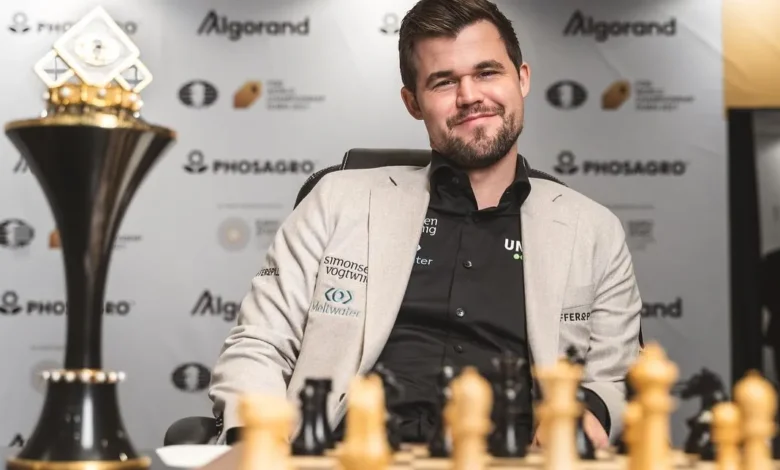Magnus Carlsen Net Worth: How the “Mozart of Chess” Built His Multi-Million Dollar Empire

When we think of the world’s wealthiest athletes, names Magnus Carlsen Net Worth like LeBron James, Lionel Messi, and Tiger Woods immediately come to mind. Their sports generate billions in revenue through massive television deals and global sponsorships.
Chess, traditionally, has not been in that league. It’s an intellectual pursuit, often associated more with prestige than profit.
Enter Magnus Carlsen Net Worth.
The Norwegian Grandmaster, widely considered the greatest chess player of all time, hasn’t just dominated the 64 squares; he has revolutionized how a chess professional can monetize their intellect and brand. Carlsen has transcended the game, becoming a savvy entrepreneur, a marketable celebrity, and a multi-millionaire.
This deep dive explores Magnus Carlsen’s net worth, dissecting the various income streams that have elevated him from a prodigy to a financial powerhouse in the world of competitive sports.
The Snapshot: Magnus Carlsen’s Estimated Net Worth in 2024
As of 2024, Magnus Carlsen Net Worth is estimated to be around $50 million USD.
It is crucial to note that this figure fluctuates based on investments, new endorsements, and market conditions. However, this estimate places him firmly as the wealthiest active chess player in the world, and arguably the wealthiest professional player in history (when accounting for his business ventures).
How did a man playing a board game accumulate such wealth? The answer lies in a combination of consistent dominance, strategic endorsements, and, most importantly, a massive business acquisition.
The Foundation: Tournament Winnings and Prize Money

For most of his career, the primary driver of Magnus Carlsen Net Worth income was his unparalleled success over the board. Since becoming World Champion in 2013 by defeating Viswanathan Anand, Carlsen has commanded the largest appearance fees and won the biggest prize funds in the chess world.
The World Championship Purses
The World Chess Championship matches are the most lucrative events in chess. While the prize funds pale in comparison to a Wimbledon final or the Super Bowl, they are significant.
For example:
- 2021 (vs. Ian Nepomniachtchi in Dubai): The total prize fund was €2 million (approx. $2.2 million USD). As the winner, Carlsen took home 60%, roughly $1.3 million.
- 2018 (vs. Fabiano Caruana in London): The prize fund was €1 million. The match went to tiebreaks, giving Carlsen a 55% share of the winnings.
Super-Tournaments and Online Circuits
Carlsen doesn’t just play World Championships. He is a fixture in “super-tournaments” like Tata Steel, Norway Chess, and the Sinquefield Cup. Winning these events typically nets between $50,000 and $100,000.
Furthermore, the rise of online chess, particularly during the pandemic, opened new revenue streams. The Magnus Carlsen Chess Tour (later the Champions Chess Tour) offered substantial prize funds, often exceeding $1.5 million across the series, with Carlsen frequently taking the top prizes.
Estimated Career Winnings: While exact figures are hard to track, it is widely estimated that Magnus Carlsen has earned over $10 million in direct prize money throughout his career.
However, $10 million in winnings does not equate to a $50 million net worth. The major leap in his wealth came not from playing chess, but from selling it.
The Game-Changer: The Play Magnus Group
This is the cornerstone of Magnus Carlsen’s wealth. Recognizing the growing digitalization of chess, Carlsen and his team didn’t just want to participate in the boom; they wanted to own it.
In 2013, the same year he became World Champion, Carlsen co-founded Play Magnus AS. The company’s initial product was an app that allowed users to play against an AI simulation of Magnus Carlsen at various ages.
A Strategy of Acquisition
The Play Magnus Group didn’t stop at one app. They executed an aggressive and intelligent growth strategy, acquiring complementary businesses in the chess ecosystem:
- Chessable: A leading chess education and learning platform utilizing spaced repetition science.
- Chess24: A major chess broadcasting, news, and online playing site.
- GingerGM: A popular chess content creator and publishing house.
- iChess.net: An extensive library of chess video courses.
The Play Magnus Group became a vertical monopoly in the digital chess space, controlling learning, playing, and viewing platforms. The company went public on the Oslo Stock Exchange, instantly increasing Carlsen’s valuation as the largest individual shareholder.
The Chess.com Acquisition: The $83 Million Deal
The chess world was rocked in 2022 when Chess.com, the largest online chess platform, announced it was acquiring the Play Magnus Group.
The deal was valued at approximately $83 million USD.
As a significant stakeholder in the Play Magnus Group (reports suggest he owned around 9% to 11% of the company at the time of the acquisition), this sale provided Carlsen with the single largest cash influx of his career. This acquisition is the primary reason his estimated net worth jumped significantly in recent years from figures previously cited around $8-$10 million to the current $50 million estimate.
Brand Magnus: Sponsorships and Endorsements
Magnus Carlsen possesses a marketability rare in chess. He is intelligent, relatively young, and has a recognizable presence even outside the chess community. This has attracted numerous high-profile sponsors, primarily from Nordic countries, but increasingly from global brands.
His sponsorship portfolio has included:
- Puma: In 2022, Carlsen signed a long-term sponsorship deal with the global sportswear giant Puma. This is perhaps the most significant apparel deal ever signed by a chess player, putting him in the same marketing league as major soccer stars and athletes.
- Unibet (Kindred Group): Carlsen had a multi-year, high-profile sponsorship with the online gambling platform Unibet, acting as a global ambassador.
- Isklar: A premium Norwegian water brand.
- Simonsen Vogt Wiig: A leading Norwegian business law firm.
- Mastercard: Carlsen has partnered with Mastercard for various campaigns related to chess and intellectual pursuits.
The Modeling Sideline
It’s worth noting Carlsen’s stint as a model. Early in his career (around 2010 and again in 2014), he was a featured model for the fashion brand G-Star Raw, alongside celebrities like Liv Tyler and Lily Cole. This showcased his appeal far beyond the traditional, often stereotyped image of a chess grandmaster.
Alternative Intellect: Poker and Fantasy Sports
While not his main source of income, Carlsen’s aptitude for strategy games extends beyond chess, providing additional revenue streams and enhancing his public persona.
Poker Winnings
Magnus is a respected amateur poker player. He frequently participates in the Norwegian Poker Championship and has played in global events like the European Poker Tour (EPT). In 2022, he demonstrated his skill by cashing respectably in the Norwegian Championship Main Event. While he treats poker as a competitive hobby, his winnings are non-trivial.
Fantasy Premier League (FPL)
Carlsen is famously proficient at Fantasy Premier League. He once ranked number one in the world out of over 7 million players. While FPL doesn’t usually offer massive cash prizes, his success further cements his brand as a master strategist, increasing his appeal to sponsors in the gaming and sports sectors.
The Cost of Being Magnus: Lifestyle and Investments
Despite his significant wealth, Magnus Carlsen is not known for an excessively flamboyant lifestyle, certainly not on the level of a top-tier NBA or Formula 1 star.
He resides in Oslo, Norway, and invests his money intelligently. His primary investment was, of course, his own company (Play Magnus Group). He is also known to have investments in real estate and various tech startups.
Being a top chess player also involves expenses. Training camps, hiring “seconds” (other grandmasters who help analyze openings and opponents), and constant global travel all cost money. However, Carlsen’s earnings far outstrip these professional expenses.
Conclusion: The New Blueprint for Chess Wealth
Magnus Carlsen’s net worth of $50 million is a testament not just to his genius over the board, but to his vision off it.
If Garry Kasparov professionalized chess in the 1990s, Magnus Carlsen commercialized and digitized it in the 2020s. He understood that in the modern era, the brand and the platform are often more valuable than the prize money itself.
By leveraging his status as the world’s best player to build a digital chess empire, Magnus Carlsen hasn’t just secured his own financial future; he has created a new blueprint for how intellectual athletes can achieve significant wealth. He is not just the King of the Chessboard; he is the CEO of the game.



